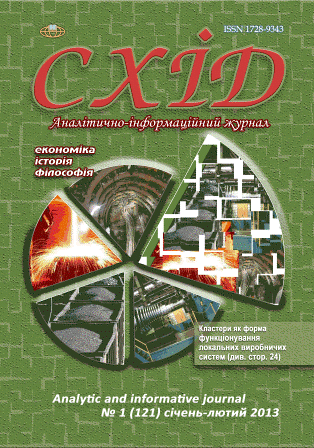Problem of universals of Christianities and differentia specifica of its life are in history (part V - Muscovy's dimensions of Christian idea: the optimistic tragedy and the triumph of pessimism)
DOI:
https://doi.org/10.21847/1728-9343.2013.1(121).13429Keywords:
archetype, myth, church, state, nation, ontological, Christian idea, the idea of Orthodox, Russian ideaAbstract
The paper is finish publication of common researches under the common title the PROBLEM OF UNIVERSALS OF CHRISTIANITES AND DIFFERENTIA SPECIFICA OF ITS LIFE ARE IN HISTORY. The analysis is centering around original features of Moscow Orthodox Christianity. The paper emphasizes that profane and sacral foundations are separated in this historical context. The incite moving of this version of Christianity more oriented to Antiquity is explored. We can observe the unequal Christian tendency that is focused on serous contradictions to Catholicism, Protestantism and Visantic's version of Orthodoxy. The paper focusers on the problems of injustice regarding these discourse as well as the evolution forms of profane world to the world of sacral justice. The paper aims at determination of a Russian idea by the grandiose utopias of the shaping intention of sacral rein. The optimistic spirits intention of Russian Orthodoxy leads to tragically circumstances and its orientation to profane suicides. Such society actualizes the tendency of rejection human norms and annihilation of social immunity. That's why only state and church can arrange the social order for peoples as well as the civilization functioning on any level.
Evidently that the eastern perception of the social life represents the paradigm of conceptualism. In the concept of Russian World we can observe the domination of realistic vision. Russian freedom is not the political or social freedom but rather the sacral freedom. The Russian civilization based on Russian idea that is rootness in realistically interpretation of freedom, justice and truth. This version of orthodoxy has to succeed in promoting the normative foundations of this framework.
Downloads
References
Аврелий Августин. О граде божьем / Августин Аврелий. - М. : Харвест, АСТ, 2000. - 1296 с.
Тургенев И. С. Полн. собр. соч. : в 30 т. / И. С. Тургенєв. - М. : Наука, 1982. - Т. 10. - 500 с.
Костомаров Н. И. Две русские народности / Н. И. Костомаров. - К. - Харків : Основи, 1991. - 324 с.
Кирилл, Патриарх Московский. О смыслах и ценностях русского мира. Выступление Святейшего патриарха Кирилла на открытии IV Ассамблеи Русского мира (3 ноября 2010 г.) / Кирилл, Патриарх Московский // Донбасс в гуманитарном пространстве Русского мира. - 2011. - С. 14-15.
Хайдеггер Мартин. Бытие и время / Мартин Хайдеггер ; [пер. В. В. Бибихина]. - М. : Ad Marginem, 1997. - 452 с.
Быков Дмитрий. Интервью / Дмитрий Быков // Итоги. - 2009. - № 53. - 28 декабря.
Федотова В. Г. Свобода или равенство? / В. Г. Федотова // Философские науки. - 1990. - № 4. - С. 16-34.
Heidegger Martin. Sein und Zeit / Martin Heidegger. - Frankfurt am Main, 1927.
Avreliy Avgustin (2000), O grade bozhem, Kharvest, AST, Moscow, 1296 р.
Turgenev I. S. (1982), Polnoye sobraniye sochineniy, Nauka, Moscow, Tom 10, 500 p.
Kostomarov N. I. (1991), Dve russkiye narodnosti, Osnovy, Kyiv, Kharkіv, 324 р.
Kirill, Patriarkh Moskovskiy (2011), Donbass v gumanitarnom prostranstve Russkogo mira, рр. 14-15.
Khaydegger Martin (1997), Bytiye i vremya, Ad Marginem, Moscow, 452 р.
Bykov Dmitriy (2009), Itogi, No. 53, December 28.
Fedotova V. G. (1990), Filosofskiye nauki, No. 4, рр. 16-34.
Heidegger Martin (1927), Sein und Zeit, Frankfurt am Main.
Downloads
Published
How to Cite
Issue
Section
License
Copyright (c) 2013 Ihor Pasko

This work is licensed under a Creative Commons Attribution-NonCommercial-NoDerivatives 4.0 International License.
1. Authors bear responsibility for the accuracy of facts, quotations, numbers and names used.
2. Manuscripts are not sent back.
3. The publisher does not always agree with the authors' opinion.
4. The authors reserve the right to authorship of the work and pass the first publication right of this work to the journal under the terms of a Creative Commons Attribution-NonCommercial-NoDerivatives 4.0 International License. This license allows others to distribute (copy) the published work for non-commercial purposes, provided there is mandatory attribution to its authors and a link to the first publication in our journal.
5. The authors have the right to conclude separate supplement agreements that relate to non-exclusive work distribution in the form in which it has been published by the journal (for example, to upload the work to the online storage of the journal or publish it as part of a monograph), provided that the reference to the first publication of the work in this journal is included.

